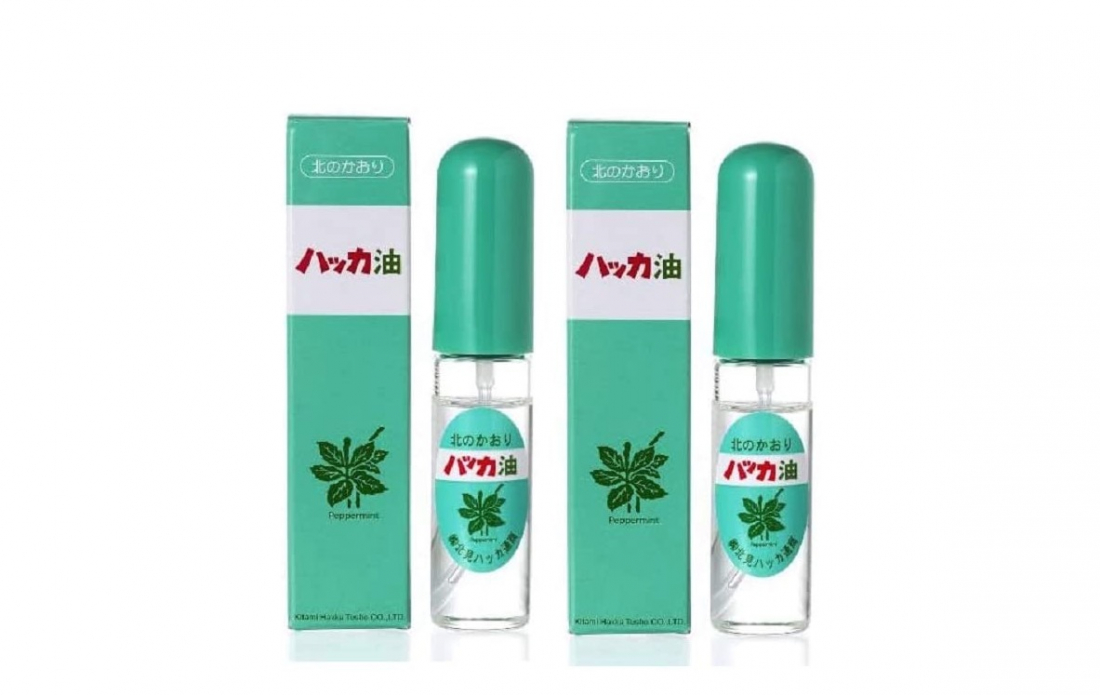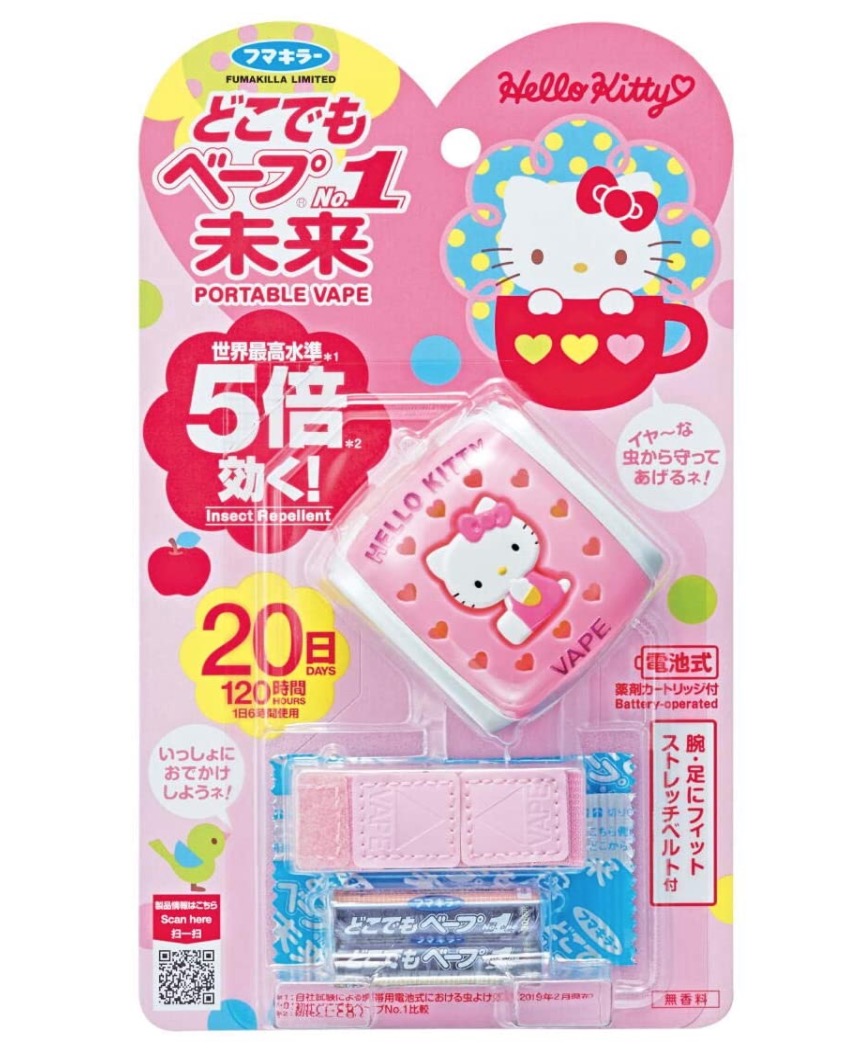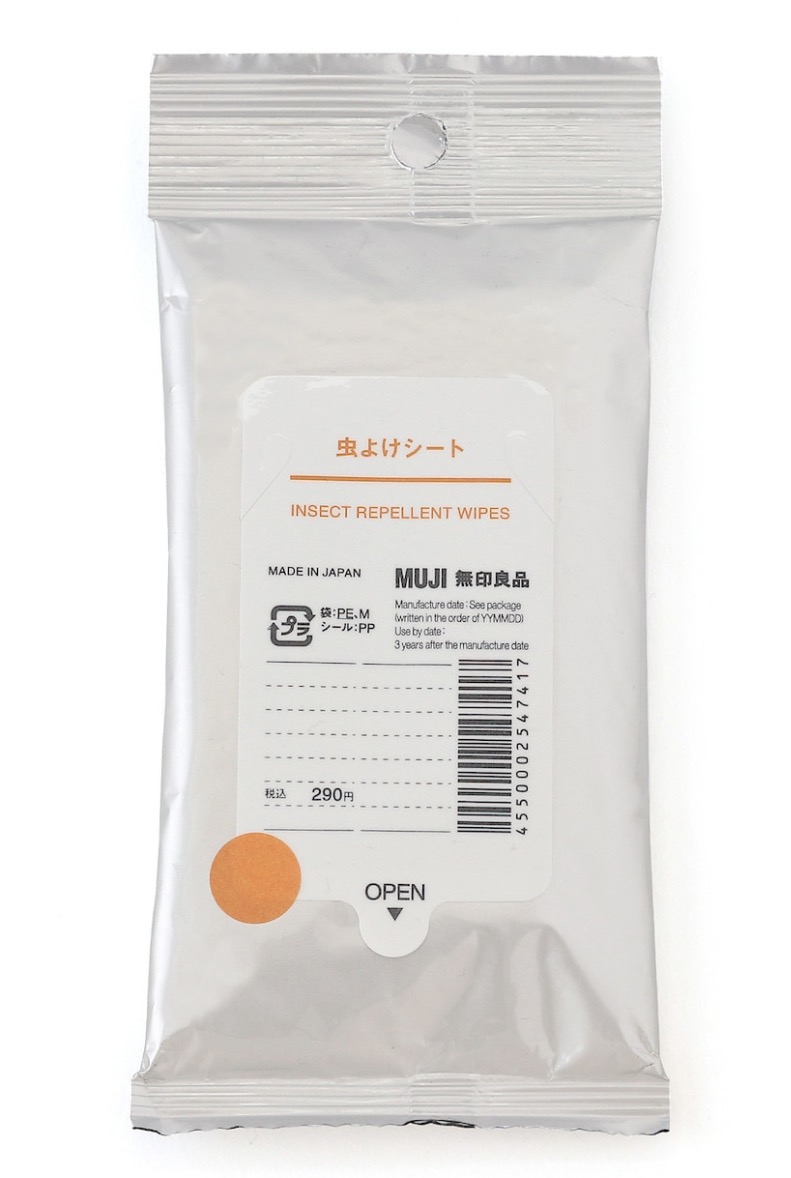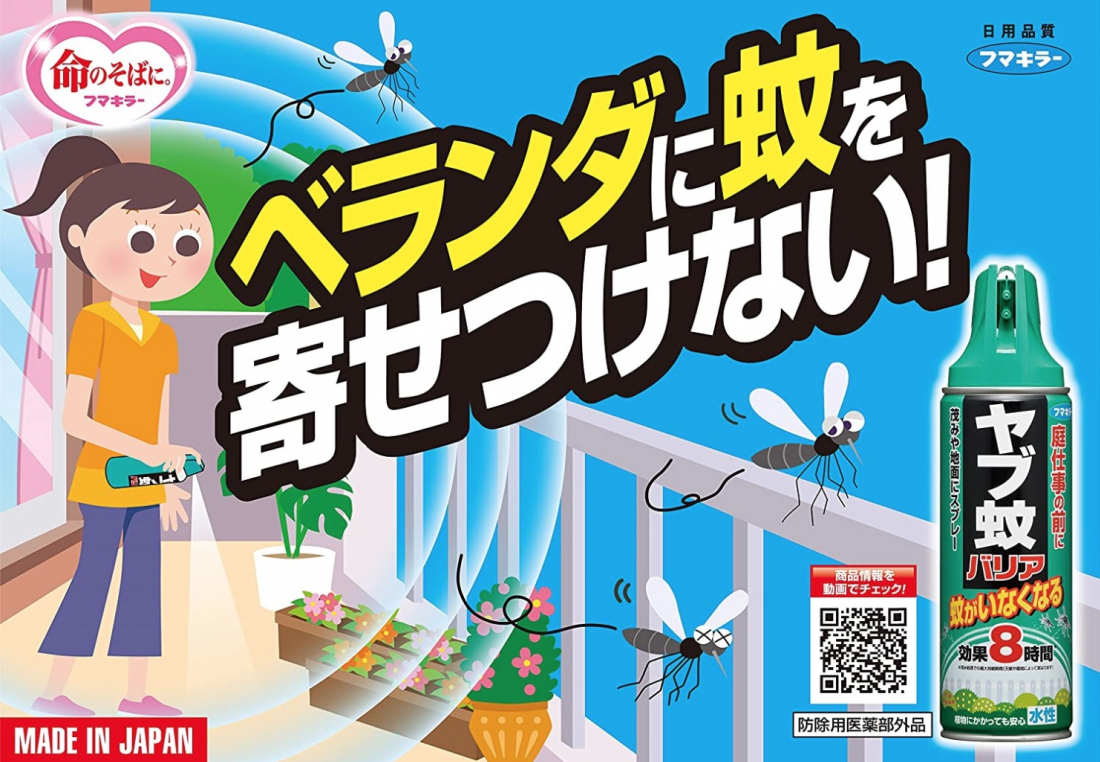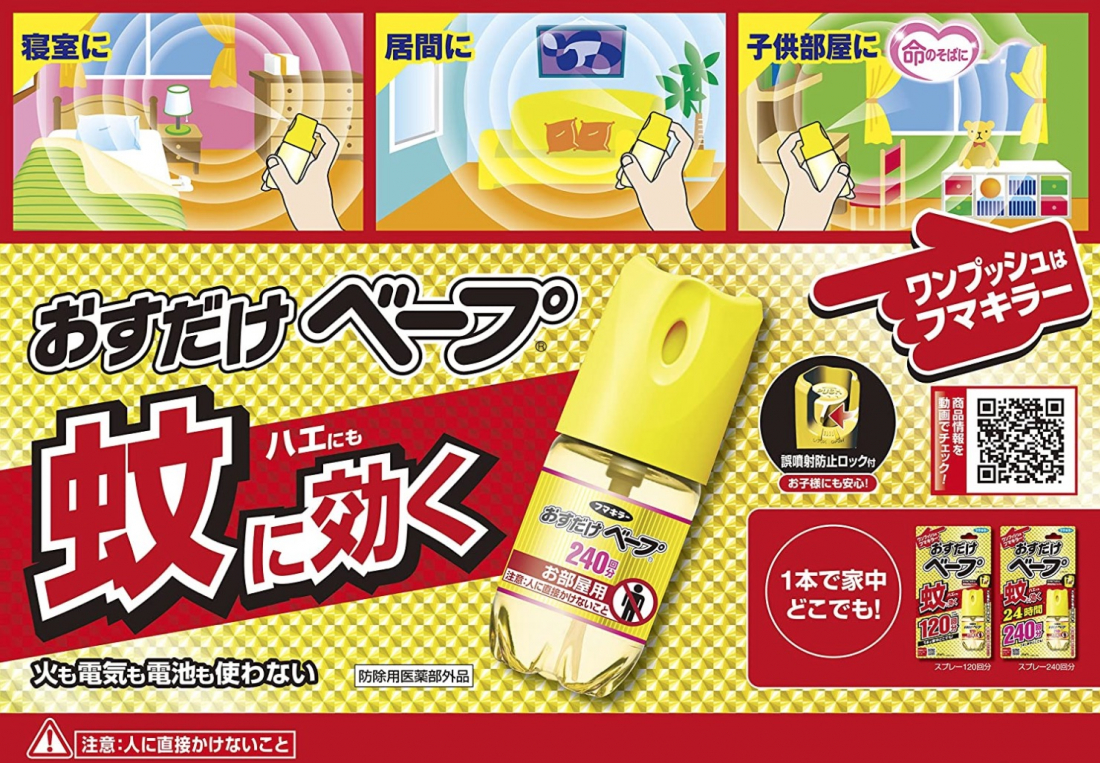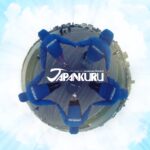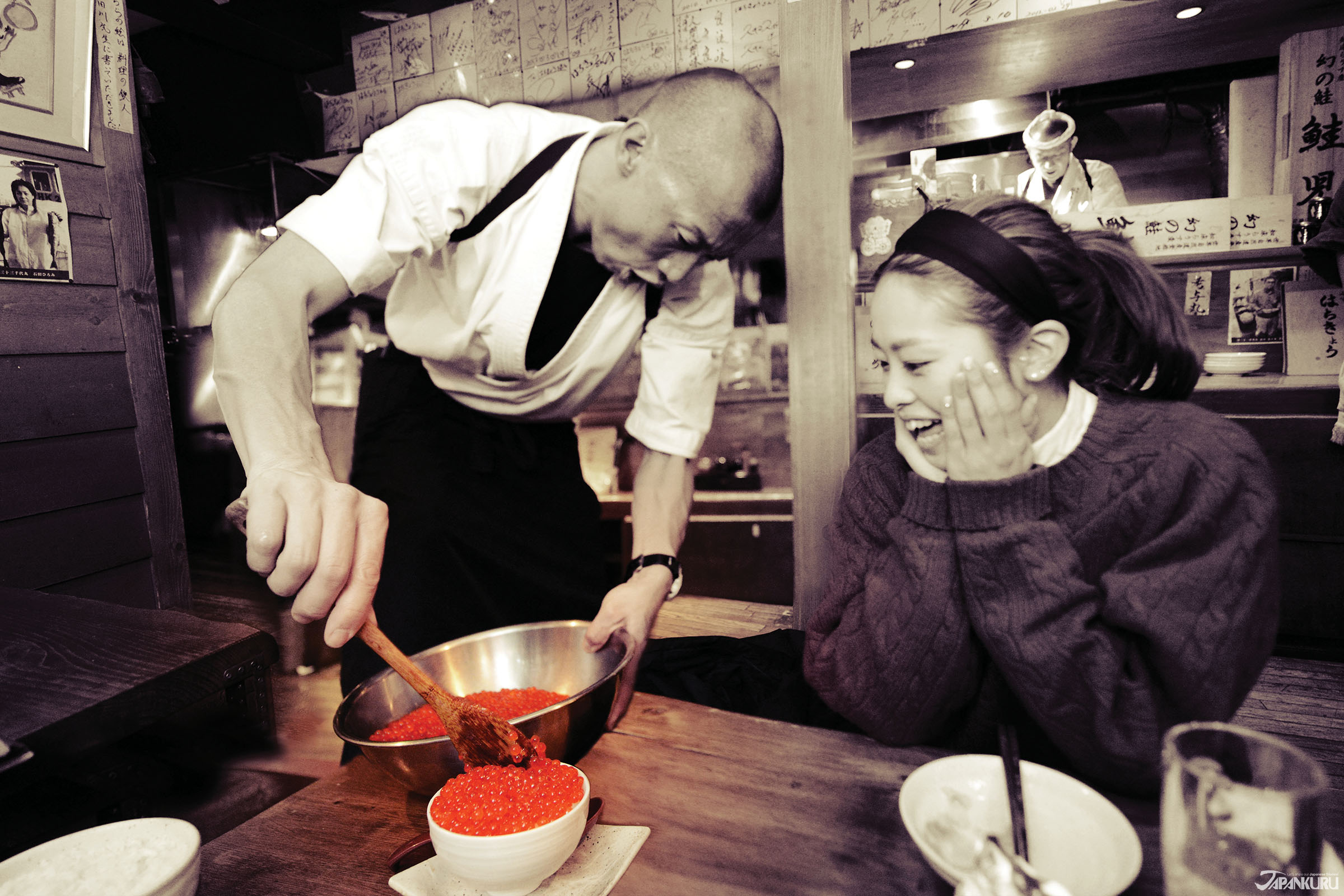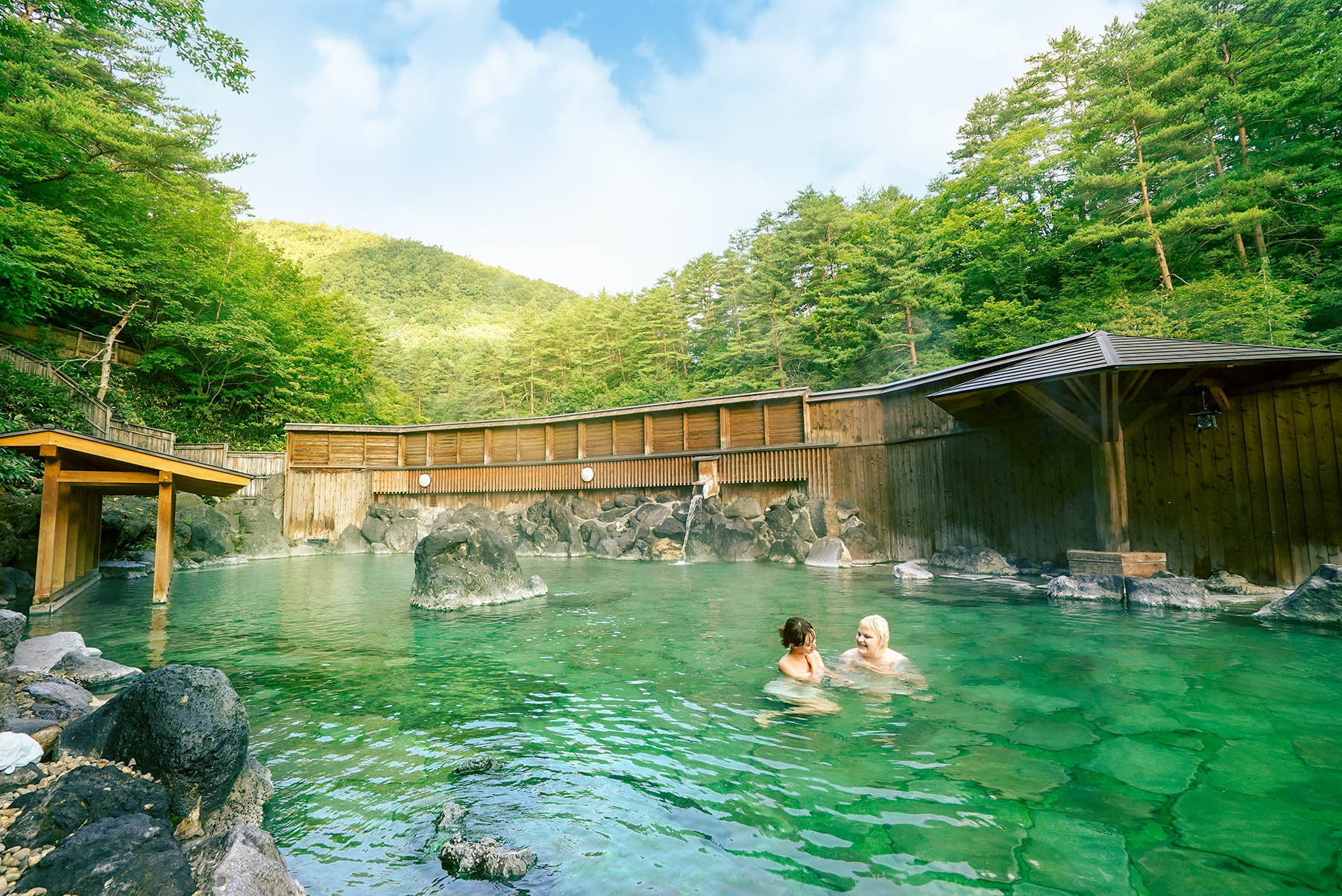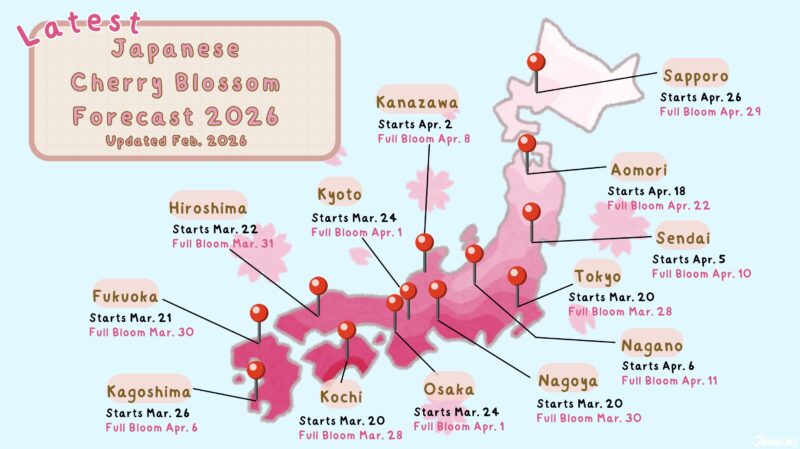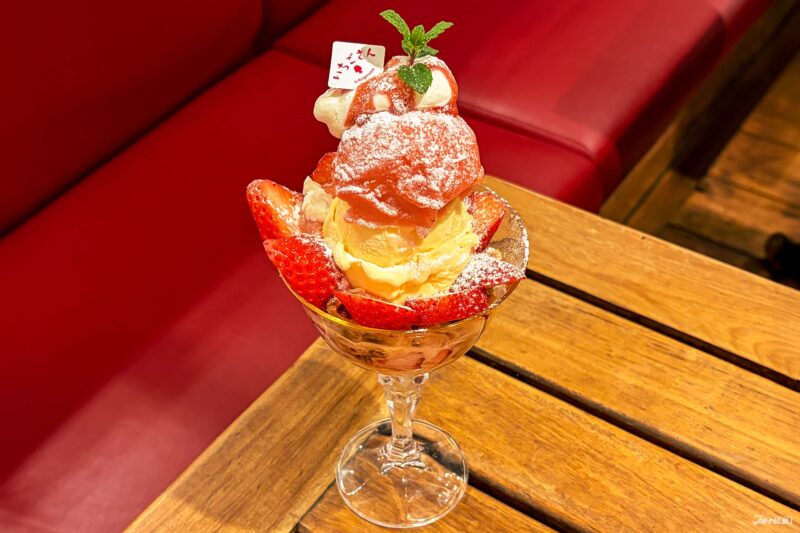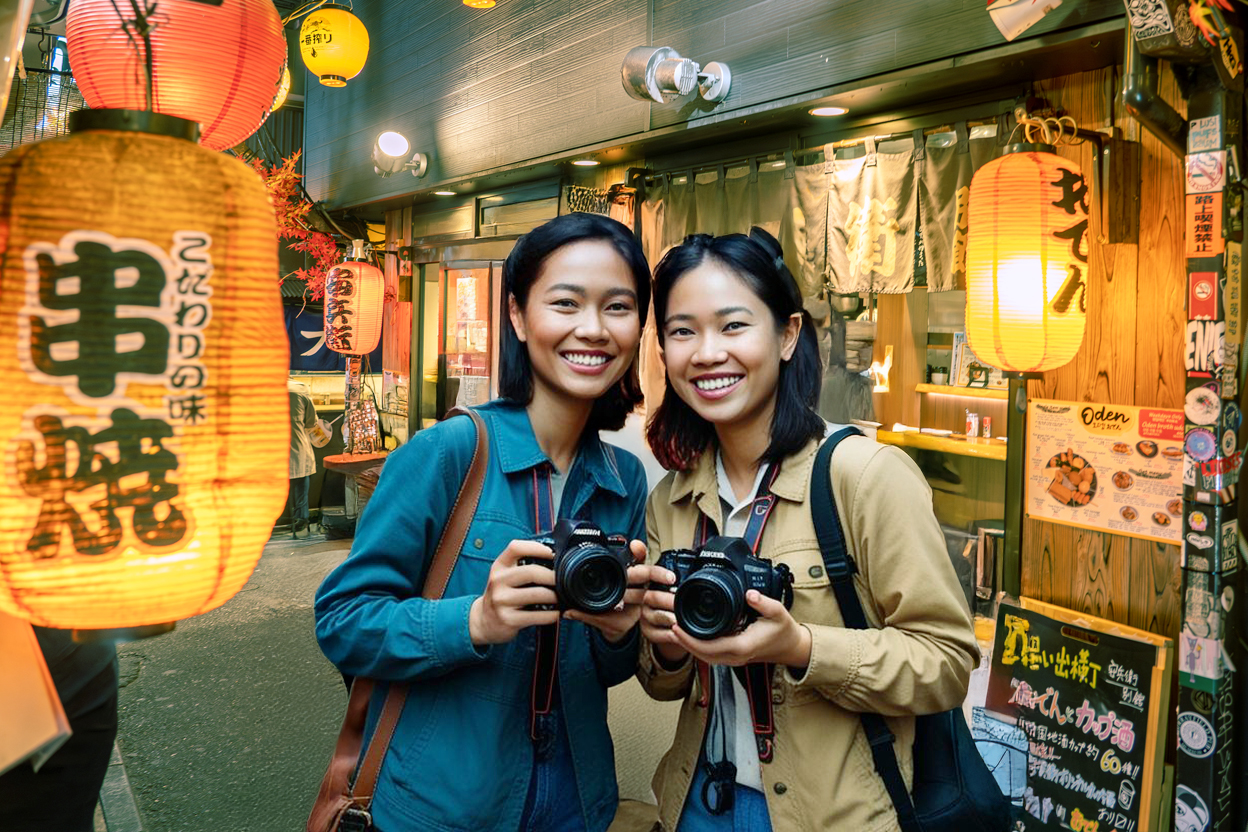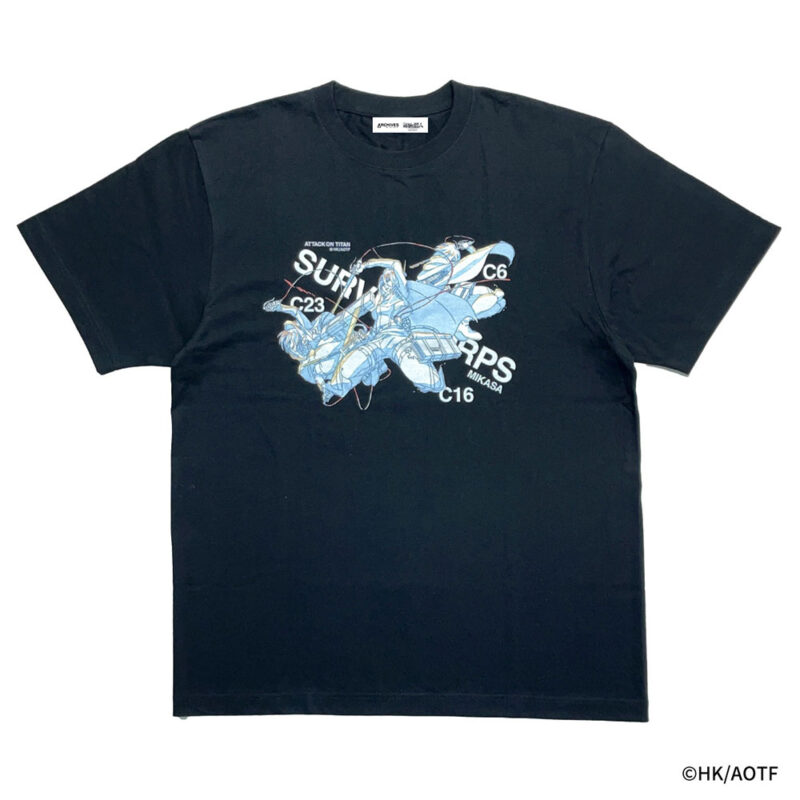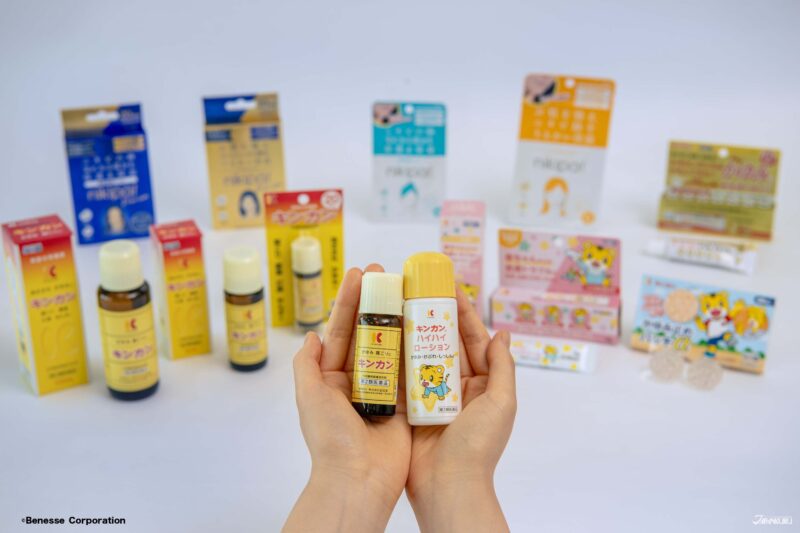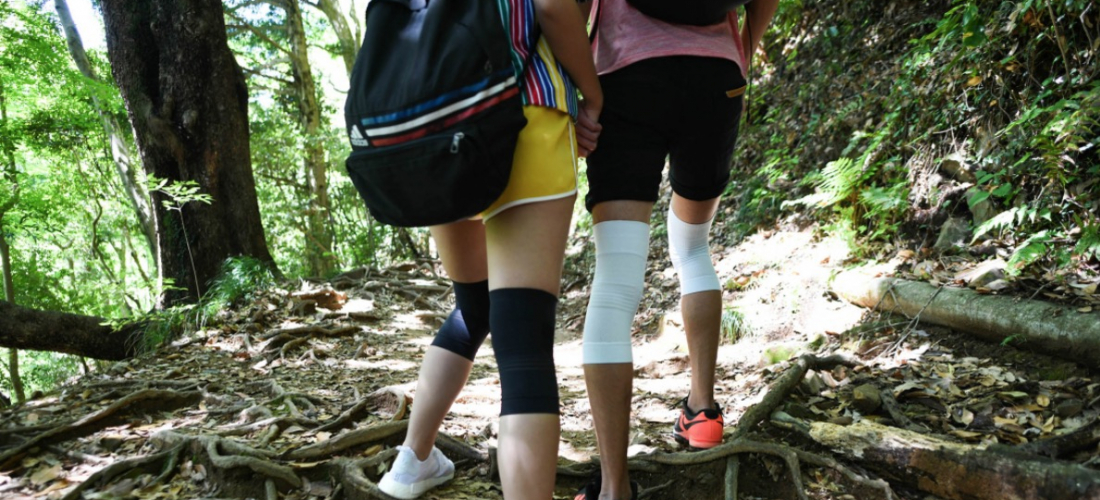
CONTENTS
With the warm humidity of Japan’s summer comes an inevitable wave of bugs, so stock up and keep the insects at bay!
Choosing the Right Bug Spray
It's summer, which means it's time to avoid three things: heatstroke, sunburn, and bug bites. Whether you're escaping Japan's bright summer sun with a hike in the woods or cooling down with a dip in the ocean, though, the bugs will follow! So it's good to know just what options there are in Japan when it comes to keeping the insects away. There are sprays for your skin, sprays for the room, coils, and vaporizers as well, made with a few common repellents.
Most of the bug sprays in Japan use just a handful of active ingredients, and like much of the world, DEET is perhaps the most common. It's been in use since the 40s, confusing mosquitos away instead of killing them. Of course, some people try to avoid DEET because incorrect application can indeed lead to health issues – everything from simple irritated skin to dizziness, and worse problems in rare cases. But its effectiveness is still just about as good as it gets, which means it's still popular.
Picaridin (a common name for Icaridin) is a more recent innovation in bug repellent, but it's quickly gaining ground with growing evidence showing its effectiveness and lack of skin irritation. While it's been around for 15 years in places like the US, Japan only approved it 10 years later, making it still something of a novelty. The chemical is actually part of the same family as one that gives black pepper its kick!
Otherwise, a handful of natural repellents are used in Japan, including ingredients like peppermint oil, pyrethrum (made from chrysanthemums), and oil of lemon eucalyptus. Evidence for these ingredients variesーsome are naturally quite effective but for limited periods, while others are stronger but irritating for children under three.
3 Popular Bug Sprays
Available on Amazon JP
Johnson Skinguard Aqua
➡ Conveniently Portable
Active Ingredient: 5% DEET
Portability is undeniably important, especially when it's a product you may need to reapply during the day (or forget to put on before you head out). The 50ml version of Johnson Skinguard Aqua is about the length of a smartphone, and since it's a non-aerosol spray under 100ml, it can even be left in your carry-on bag when boarding a plane within Japan. While the main repellent ingredient is DEET, it also contains aloe and mint, making the formula non-sticky and also refreshing in the summer.
Available on Amazon JP
Fumakilla Tenshi no Skin Vape
➡ Good for Kids
Active Ingredient: 5% Picaridin
We already mentioned that Picaridin is easier on the skin than DEET and other repellents. Easy to spray, covered in pink and cute circus animals, and with a name that literally means "angel's skin vapor", it's no surprise this product marketed as "kid-friendly" uses Picaridin as the main ingredient.
Available on Amazon JP
Kitami Hakka Peppermint Oil Spray
➡ Natural, Multipurpose
Active Ingredient: Peppermint Oil
For those looking for a natural alternative, this bottle of traditional Japanese peppermint oil might be a good choice. While evidence shows that DEET and Picaridin do a more complete job of repelling bugs, peppermint oil is known to be effective, and Kitami even recommends you use there product for a host of different purposes: as an aromatic oil, added to a bath, mixed into a drink…
Repellents of Different Shapes & Sizes
Traditional Pyrethrum Mosquito Coil
➡ Traditional
Active Ingredient: Pyrethrum
Often found within a "kayaributa" (蚊遣豚, pig-shaped burner), pyrethrum has been used as a natural insecticide for centuries, and even today you'll find people burning the anti-mosquito coils around Japan. These days other products have become standard, but the cute little pigs make for appealing souvenirs, whether you use them as burners or not.
Available on Amazon JP
Fumakilla Dokodemo Vape #1
➡ Mosquito Coil, but Portable
Active Ingredient: Metofluthrin (Pyrethrum)
Not a fan of sprays, but still on the move and ready to go? This little gadget is like a portable mosquito coil that can be worn on the wrist or ankle, or even clipped on a bag. Very stylish, thanks to its Hello Kitty design. It's called a "vape" because it's vaporizing the mosquito coil ingredients, of course―don't try to breathe it in!
Available at MUJI
MUJI Insect Repellent Wipes
➡ Sleek and Convenient
Active Ingredient: DEET
MUJI's series of wet wipes includes some fascinating products―a whole new world of wipes! These ones contain DEET to keep the mosquitos away, but the formula also has aloe, chamomile, and lavender, making them fairly appealing to swipe over any exposed limbs when the bugs attack.
Household Sprays
Available on Amazon JP
Fumakilla Yabuka Barrier
➡ A Japankuru Editor Favorite!
Made to be sprayed in a well-ventilated outdoor space and not on your body, this product claims to repel mosquitoes from the area for eight hours (without killing your plants!). Some members of the Japankuru team swear by this stuff.
Available on Amazon JP
Fumakilla 24-Hour Asu Dake Vape
➡ Indoor Use
Window screens not doing a good job keeping the bugs out? This spray says it's safe enough to use in children's rooms, and just one spray will keep bugs out for 24 hours. Of course, even if it's safe to use indoors, you definitely should not breathe it in directly, so take care if you decide to spray it around the house.
A Brief Bug Spray Q & A
Are these safe for kids?
According to Japan's Ministry of Health, Labour, and Welfare, while children under 12 should only use insect repellents under the supervision of adults, and infants under 6 months should avoid them altogether, common repellent products are safe for most children. Other authorities have recommended DEET percentages for use when it comes to children, all of the sprays above fall below those guidelines.
Are these safe to use while pregnant?
According to Japanese maternity magazine Maternity (マタニティ), insect repellent use (in accordance with the guidelines for each product) shouldn't be an issue, but checking in with a doctor beforehand is always a good idea!
Got any other questions? Drop us a line at the Japankuru twitter, instagram, and facebook!
Details
NAME:Insect Repellent
COMMENT
FEATURED MEDIA
VIEW MORE 
A New Tokyo Animal Destination: Relax & Learn About the World’s Animals in Japan
#pr #japankuru #anitouch #anitouchtokyodome #capybara #capybaracafe #animalcafe #tokyotrip #japantrip #카피바라 #애니터치 #아이와가볼만한곳 #도쿄여행 #가족여행 #東京旅遊 #東京親子景點 #日本動物互動體驗 #水豚泡澡 #東京巨蛋城 #เที่ยวญี่ปุ่น2025 #ที่เที่ยวครอบครัว #สวนสัตว์ในร่ม #TokyoDomeCity #anitouchtokyodome

Shohei Ohtani Collab Developed Products & Other Japanese Drugstore Recommendations From Kowa
#pr #japankuru
#kowa #syncronkowa #japanshopping #preworkout #postworkout #tokyoshopping #japantrip #일본쇼핑 #일본이온음료 #오타니 #오타니쇼헤이 #코와 #興和 #日本必買 #日本旅遊 #運動補充能量 #運動飲品 #ช้อปปิ้งญี่ปุ่น #เครื่องดื่มออกกำลังกาย #นักกีฬา #ผลิตภัณฑ์ญี่ปุ่น #อาหารเสริมญี่ปุ่น

도쿄 근교 당일치기 여행 추천! 작은 에도라 불리는 ‘가와고에’
세이부 ‘가와고에 패스(디지털)’ 하나면 편리하게 이동 + 가성비까지 완벽하게! 필름카메라 감성 가득한 레트로 거리 길거리 먹방부터 귀여움 끝판왕 핫플&포토 스폿까지 총집합!
Looking for day trips from Tokyo? Try Kawagoe, AKA Little Edo!
Use the SEIBU KAWAGOE PASS (Digital) for easy, affordable transportation!
Check out the historic streets of Kawagoe for some great street food and plenty of picturesque retro photo ops.
#pr #japankuru #도쿄근교여행 #가와고에 #가와고에패스 #세이부패스 #기모노체험 #가와고에여행 #도쿄여행코스 #도쿄근교당일치기 #세이부가와고에패스
#tokyotrip #kawagoe #tokyodaytrip #seibukawagoepass #kimono #japantrip

Hirakata Park, Osaka: Enjoy the Classic Japanese Theme Park Experience!
#pr #japankuru #hirakatapark #amusementpark #japantrip #osakatrip #familytrip #rollercoaster #retrôvibes #枚方公園 #大阪旅遊 #關西私房景點 #日本親子旅行 #日本遊樂園 #木造雲霄飛車 #히라카타파크 #สวนสนุกฮิราคาตะพาร์ค

🍵Love Matcha? Upgrade Your Matcha Experience With Tsujiri!
・160년 전통 일본 말차 브랜드 츠지리에서 말차 덕후들이 픽한 인기템만 골라봤어요
・抹茶控的天堂!甜點、餅乾、飲品一次滿足,連伴手禮都幫你列好清單了
・ส่องมัทฉะสุดฮิต พร้อมพาเที่ยวร้านดังในอุจิ เกียวโต
#pr #japankuru #matcha #matchalover #uji #kyoto #japantrip #ujimatcha #matchalatte #matchasweets #tsujiri #말차 #말차덕후 #츠지리 #교토여행 #말차라떼 #辻利抹茶 #抹茶控 #日本抹茶 #宇治 #宇治抹茶 #日本伴手禮 #抹茶拿鐵 #抹茶甜點 #มัทฉะ #ของฝากญี่ปุ่น #ชาเขียวญี่ปุ่น #ซึจิริ #เกียวโต

・What Is Nenaito? And How Does This Sleep Care Supplement Work?
・你的睡眠保健品——認識「睡眠茶氨酸錠」
・수면 케어 서플리먼트 ‘네나이토’란?
・ผลิตภัณฑ์เสริมอาหารดูแลการนอน “Nenaito(ネナイト)” คืออะไร?
#pr #japankuru #sleepcare #japanshopping #nenaito #sleepsupplement #asahi #睡眠茶氨酸錠 #睡眠保健 #朝日 #l茶胺酸 #日本藥妝 #日本必買 #일본쇼핑 #수면 #건강하자 #네나이토 #일본영양제 #อาหารเสริมญี่ปุ่น #ช้อปปิ้งญี่ปุ่น #ร้านขายยาญี่ปุ่น #ดูแลตัวเองก่อนนอน #อาซาฮิ

Japanese Drugstore Must-Buys! Essential Items from Hisamitsu® Pharmaceutical
#PR #japankuru #hisamitsu #salonpas #feitas #hisamitsupharmaceutical #japanshopping #tokyoshopping #traveltips #japanhaul #japantrip #japantravel

Whether you grew up with Dragon Ball or you just fell in love with Dragon Ball DAIMA, you'll like the newest JINS collab. Shop this limited-edition Dragon Ball accessory collection to find some of the best Dragon Ball merchandise in Japan!
>> Find out more at Japankuru.com! (link in bio)
#japankuru #dragonball #dragonballdaima #animecollab #japanshopping #jins #japaneseglasses #japantravel #animemerch #pr

This month, Japankuru teamed up with @official_korekoko to invite three influencers (originally from Thailand, China, and Taiwan) on a trip to Yokohama. Check out the article (in Chinese) on Japankuru.com for all of their travel tips and photography hints - and look forward to more cool collaborations coming soon!
【橫濱夜散策 x 教你怎麼拍出網美照 📸✨】
每次來日本玩,是不是都會先找旅日網紅的推薦清單?
這次,我們邀請擁有日本豐富旅遊經驗的🇹🇭泰國、🇨🇳中國、🇹🇼台灣網紅,帶你走進夜晚的橫濱!從玩樂路線到拍照技巧,教你怎麼拍出最美的夜景照。那些熟悉的景點,換個視角說不定會有新發現~快跟他們一起出發吧!
#japankuru #橫濱紅磚倉庫 #汽車道 #中華街 #yokohama #japankuru #橫濱紅磚倉庫 #汽車道 #中華街 #yokohama #yokohamaredbrickwarehouse #yokohamachinatown

If you’re a fan of Vivienne Westwood's Japanese designs, and you’re looking forward to shopping in Harajuku this summer, we’ve got important news for you. Vivienne Westwood RED LABEL Laforet Harajuku is now closed for renovations - but the grand reopening is scheduled for July!
>> Find out more at Japankuru.com! (link in bio)
#japankuru #viviennewestwood #harajuku #omotesando #viviennewestwoodredlabel #viviennewestwoodjapan #비비안웨스트우드 #오모테산도 #하라주쿠 #日本購物 #薇薇安魏斯伍德 #日本時尚 #原宿 #表參道 #japantrip #japanshopping #pr

Ready to see TeamLab in Kyoto!? At TeamLab Biovortex Kyoto, the collective is taking their acclaimed immersive art and bringing it to Japan's ancient capital. We can't wait to see it for ourselves this autumn!
>> Find out more at Japankuru.com! (link in bio)
#japankuru #teamlab #teamlabbiovortex #kyoto #kyototrip #japantravel #artnews
Photos courtesy of teamLab, Exhibition view of teamLab Biovortex Kyoto, 2025, Kyoto ® teamLab, courtesy Pace Gallery

Japanese Makeup Shopping • A Trip to Kamakura & Enoshima With Canmake’s Cool-Toned Summer Makeup
#pr #canmake #enoshima #enoden #에노시마 #캔메이크 #japanesemakeup #japanesecosmetics

⚔️The Robot Restaurant is gone, but the Samurai Restaurant is here to take its place. Check it out, and don't forget your coupon!
🍣신주쿠의 명소 로봇 레스토랑이 사무라이 레스토랑으로 부활! 절찬 쿠폰 발급중
💃18歲以上才能入場的歌舞秀,和你想的不一樣!拿好優惠券去看看~
#tokyo #shinjuku #samurairestaurant #robotrestaurant #tokyotrip #도쿄여행 #신주쿠 #사무라이레스토랑 #이색체험 #할인이벤트 #歌舞伎町 #東京景點 #武士餐廳 #日本表演 #日本文化體驗 #japankuru #japantrip #japantravel #japanlovers #japan_of_insta

Japanese appliance & electronics shopping with our KOJIMA x BicCamera coupon!
用JAPANKURU的KOJIMA x BicCamera優惠券買這些正好❤️
코지마 x 빅 카메라 쿠폰으로 일본 가전 제품 쇼핑하기
#pr #japankuru #japanshopping #kojima #biccamera #japaneseskincare #yaman #dji #osmopocket3 #skincaredevice #日本購物 #美容儀 #相機 #雅萌 #日本家電 #일본여행 #면세 #여행꿀팁 #일본쇼핑리스트 #쿠폰 #일본쇼핑 #일본브랜드 #할인 #코지마 #빅카메라 #japankurucoupon




